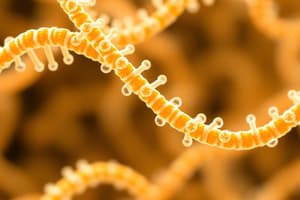Podcast
Questions and Answers
What is the primary role of nucleotides in cellular biology?
What is the primary role of nucleotides in cellular biology?
- They serve exclusively as signaling molecules.
- They can only function as structural components of cells.
- They are the building blocks of DNA and RNA. (correct)
- They act as energy carriers in metabolic processes.
Which of the following correctly describes deoxyribose?
Which of the following correctly describes deoxyribose?
- A sugar that is missing an oxygen atom at carbon 2. (correct)
- A sugar that is part of RNA nucleotides.
- A type of purine nitrogenous base.
- A sugar with an oxygen atom at carbon 2.
What type of bond forms between a nitrogenous base and a sugar in a nucleoside?
What type of bond forms between a nitrogenous base and a sugar in a nucleoside?
- Hydrogen bond.
- Ionic bond.
- Peptide bond.
- N-glycosidic bond. (correct)
Which nitrogenous base is found only in DNA?
Which nitrogenous base is found only in DNA?
Which of the following statements about purine and pyrimidine bases is true?
Which of the following statements about purine and pyrimidine bases is true?
Which of the following is a nucleotide composed of deoxyadenosine?
Which of the following is a nucleotide composed of deoxyadenosine?
What role does Cyclic AMP (cAMP) primarily serve in biological systems?
What role does Cyclic AMP (cAMP) primarily serve in biological systems?
Which nucleotide acts as a source of energy in cellular processes?
Which nucleotide acts as a source of energy in cellular processes?
Which of the following nucleotides is known for its role as a methyl donor?
Which of the following nucleotides is known for its role as a methyl donor?
Which of the following statements is true regarding the function of nucleotides?
Which of the following statements is true regarding the function of nucleotides?
Flashcards are hidden until you start studying
Study Notes
Nucleic Acids
- Nucleic acids, DNA and RNA, are composed of repeating subunits called nucleotides.
- Nucleotides are the building blocks of DNA and RNA.
- Nucleotides exist as polynucleotide chains (in DNA and RNA) or as free nucleotides.
Nucleotide Structure
- Nucleotides are composed of three components:
- Nitrogenous base: Adenine (A), Guanine (G), Cytosine (C), Thymine (T) or Uracil (U)
- Pentose sugar: Ribose (in RNA) or Deoxyribose (in DNA)
- Phosphate group (Phosphoric acid)
Pentose Sugar
- Ribose is the sugar present in ribonucleic acid (RNA).
- Deoxyribose is the sugar in deoxyribonucleic acid (DNA), it is essentially a ribose sugar with the removal of an oxygen atom from the 2-carbon atom.
Phosphate
- Phosphoric acid attaches to the 5-carbon of ribose by an ester bond.
Nitrogenous Bases
- Two families of nitrogenous bases exist:
- Purine bases (two rings): Adenine (A) and Guanine (G)
- Pyrimidine bases (one ring): Cytosine (C), Thymine (T) (DNA), and Uracil (U) (RNA)
Minor Nitrogenous Bases
- Other purine metabolites like Xanthine, Hypoxanthine, and uric acid are not usually found in nucleic acids.
Nucleosides
- Nucleosides are formed by covalently linking a nitrogenous base to the 1-carbon of a sugar via an N-glycosidic bond.
- The base is attached to the 1-carbon of the sugar.
Nucleotides
- Nucleotides are formed when one or more phosphate groups are attached to the 5-carbon of the nucleoside.
- Nucleoside di- and triphosphates are high-energy compounds
Nomenclature of Ribonucleotides
- Base | Nucleoside | Nucleotide | Diphosphate | Triphosphate
- Adenine | Adenosine | Adenylic Acid (AMP) | Adenosine Diphosphate (ADP) | Adenosine Triphosphate (ATP)
- Guanine | Guanosine | Guanylic Acid (GMP) | Guanosine Diphosphate (GDP) | Guanosine Triphosphate (GTP)
- Cytosine | Cytidine | Cytidylic Acid (CMP) | Cytidine Diphosphate (CDP) | Cytidine Triphosphate (CTP)
- Uracil | Uridine | Uridylic Acid (UMP) | Uridine Diphosphate (UDP) | Uridine Triphosphate (UTP)
Nomenclature of Deoxyribonucleotides
- Base | Nucleoside | Nucleotide | Diphosphate | Triphosphate
- Adenine | Deoxyadenosine | Deoxyadenylic Acid (dAMP) | Deoxyadenosine Diphosphate (dADP) | Deoxyadenosine Triphosphate (dATP)
- Guanine | Deoxyguanosine | Deoxyguanylic Acid (dGMP) | Deoxyguanosine Diphosphate (dGDP) | Deoxyguanosine Triphosphate (dGTP)
- Cytosine | Deoxycytidine | Deoxycytidylic Acid (dCMP)| Deoxycytidine Diphosphate (dCDP) | Deoxycytidine Triphosphate (dCTP)
- Thymine | Deoxythymidine | Deoxythymidylic Acid (dTMP) | Deoxythymidine Diphosphate (dTMP) | Deoxythymidine Triphosphate (dTTP)
Other Important Nucleotides
- S-adenosyl methionine (SAM): A methyl group donor
- Phosphoadenosine-phospho-sulfate (PAPS): A sulfate donor
- Cyclic AMP (c.AMP): A second messenger for hormone action
Functions of Nucleotides
- Building blocks of RNA and DNA
- Energy source: ATP and GTP act as energy carriers.
- Mediation of hormone action: c.AMP and c.GMP are second messengers.
- Co-enzymes: NAD, FAD, and Co-enzyme A.
Studying That Suits You
Use AI to generate personalized quizzes and flashcards to suit your learning preferences.




